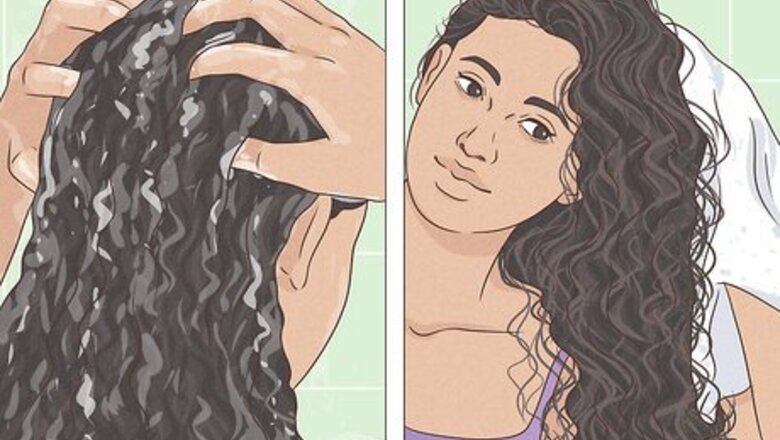
views
Setup
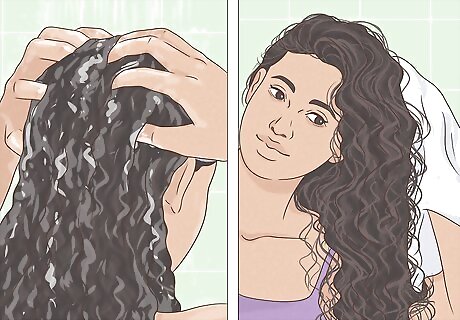
Wash and air-dry your hair before cutting it for the best results. Dry, product-free hair lets you cut each curl at the right spot. It’s also easier to see how your hair reacts and resettles as it loses weight so you can make adjustments as you work. This might seem counterintuitive if you’ve only had wet cuts before, but it’s a super common and helpful practice for people with perms. Some curly-hair experts cut permed hair when it’s wet. Ultimately, the decision is up to you. The risk is that when your hair dries, the curl pattern might be off because individual strands can react differently and shrink more than you might expect.
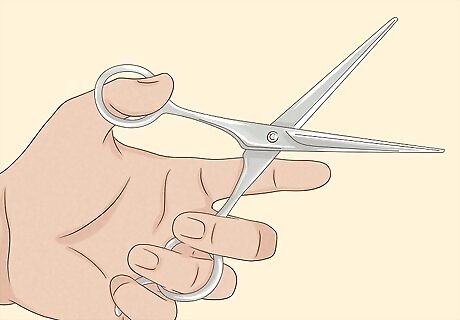
Use sharp hair-cutting shears to trim your locks. This might seem obvious, but sharp scissors produce a much better result than dull ones. If you don’t have hair-cutting shears (which you can find at your local beauty supply store), precision scissors are a great alternative. You’ll notice that hair-cutting shears are a lot shorter than your pair of traditional scissors. That’s because you generally don’t use the blade's whole length when cutting hair; just the very sharp ends are used to make precise cuts.
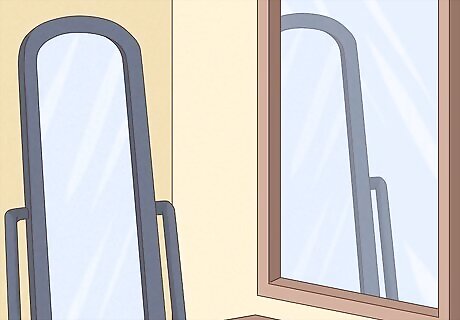
Set up several mirrors if you’re cutting your own hair. If you’re giving yourself a trim, it can be tricky to make precise cuts when you can’t see what you’re doing. Trying to balance holding a mirror and a pair of scissors while you cut is also pretty difficult! If possible, set yourself up in front of a mirror and place another behind you so it’s easier to see what you’re doing. A handheld mirror also helps you check out all the angles as you work.
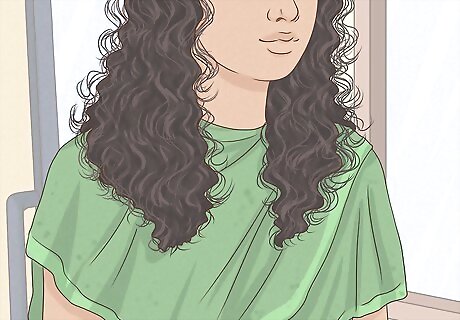
Put a towel over your shoulders to keep hair off your clothes. This is optional, but if you want to keep wearing the same outfit, you’re going to want to protect it while you cut your hair. If the towel is large enough, drape it over your shoulders and back around so you’re completely covered. If you need to, overlap 2 smaller towels. If you have a hair-cutting cape, even better! But it’s not necessary to go out and buy anything new if you don’t. For even easier cleanup, cut your hair outside if the weather is nice.
Cutting Technique
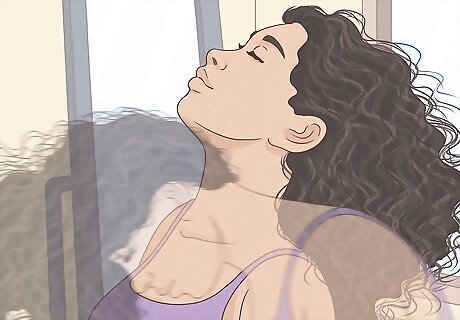
Shake your hair back and forth so it settles into its natural state. This is especially helpful if you tucked your hair behind your ears or had it pulled off to the side. If you have long hair, part it down the middle and pull each side over your shoulders. Look for dead ends, areas that are particularly frizzy or limp, and at the general shape of your hair to help you decide where you need to cut. You might be thinking that this is definitely not how you cut your pre-permed hair. If it helps, try to remember that you turned into a curly-haired person once you got your perm. So cutting, styling, and caring for your hair all look a little different from before.

Pick up a curl from the front of your hairline and stretch it out. Start along the edge of your face rather than in the middle or back of your hair. Imagine your face is a clock, and stretch that strand of hair up toward its coordinating position on the clock. For example, the curls from the top of your head go toward 11, 12, and 1 o’clock positions. The hair on the sides goes toward the 2, 3, 4, and 8, 9, and 10 o’clock positions. Curls from the bottom point toward the 5, 6, and 7 o’clock positions. Since you’re doing a dry cut, you don’t have to section out your hair. It actually helps to see all your curls down together so you can make each cut at the right place.
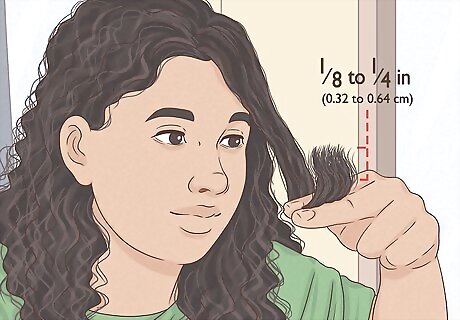
Hold the curl between 2 fingers where you plan to cut. If there are dead ends, plan on trimming about ⁄8 to ⁄4 in (0.32 to 0.64 cm) from the end. For a more dramatic cut, measure about 1 to 2 inches (2.5 to 5.1 cm). When you cut permed hair, the loss of excess weight makes curls spring up even further than you anticipate. So, you sometimes lose more length than just the amount of hair you trimmed away.
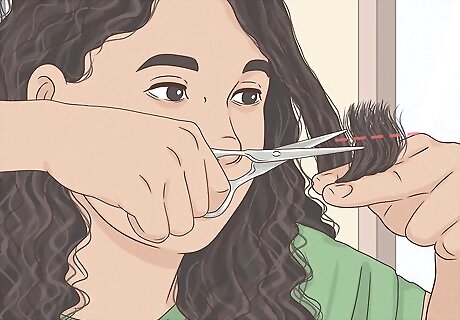
Cut above your fingers across the curl with the ends of your shears. Avoid holding your scissors at an angle, and do your best to make as straight of a cut as possible. Patience is key here—you might want to rush and get your cut over with, but take your time. Especially with permed, curly, textured hair, an accidental cut could mean you have to trim off a lot more length than you intended.
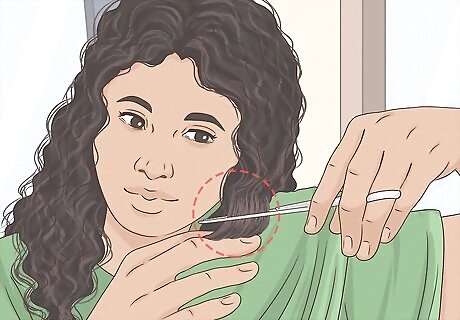
Work your way around your head and continue cutting curl by curl. After each cut, release the curl and look at where it lands and how it looks. Trim a little more off if you need to. Use mirrors to see the back of your head, and periodically shake out your hair so it resettles and makes it easier to see areas you may have missed. Depending on the shape and health of your hair, you might not have to cut every single curl.
Perm Care
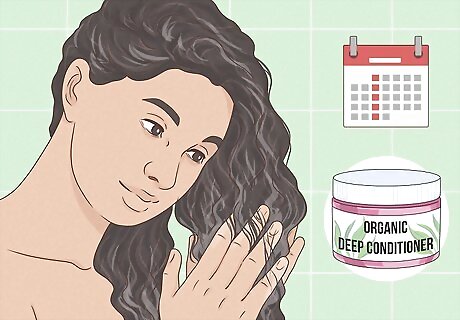
Treat your hair to a deep-conditioning treatment to keep it healthy. When you perm your hair, the shafts become more porous than they were before. This means that your locks need a bit more moisture than they may have in your pre-perm life! Keep your hair moisturized and conditioned to make your curls look their best. Try to schedule a conditioning treatment at least once a week. You can do them more often if your hair needs it.
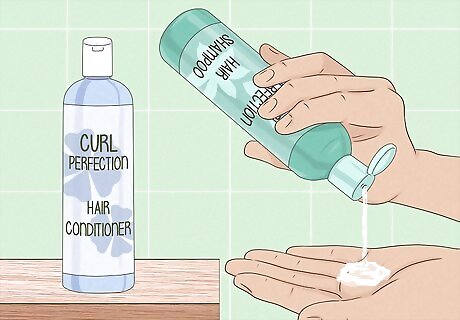
Use shampoos and conditioners made specifically for curly hair. And, avoid products that are especially creamy or heavy, as they’ll weigh down your locks. Avoid products that contain alcohol, parabens, and sulfates.
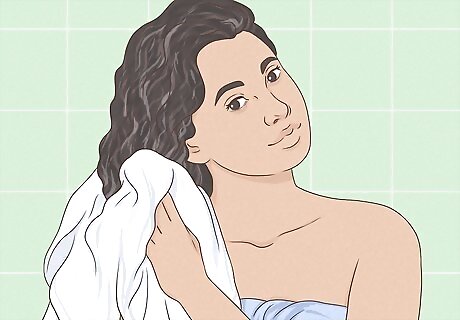
Opt for a soft tee in place of a towel when drying your locks. Gently pat and scrunch your hair to help it dry faster, but don’t rub it. Rubbing your hair increases breakage and creates frizz. A microfiber towel also works well if you want to wrap your hair up after a shower as you get ready.
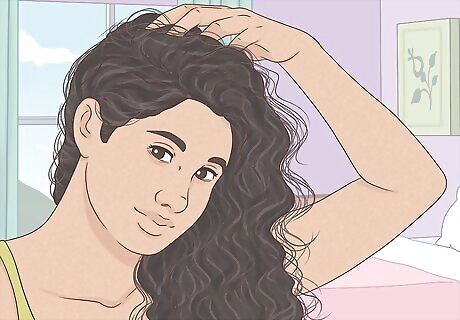
Avoid heat-styling tools as much as possible. Chemically-treated hair is a lot more susceptible to damage from heat. Skip the hairdryers and straighteners and let your hair dry naturally when you can. If you do want to straighten your permed hair, check out this great article for some helpful tips and tricks.
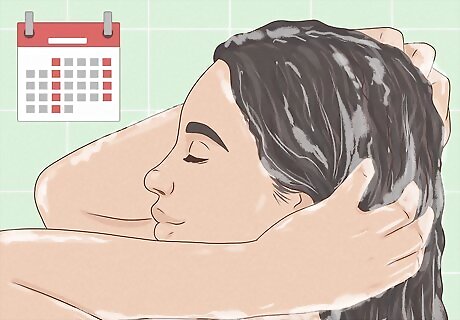
Wash your hair every 3 days to keep it from drying out. Try to avoid water as much as possible when you have a perm—the water will relax the curl. Over time, it can even cause your hair to straighten back out. If your hair needs a little help between washes, check out dry shampoo—it can refresh and lift your locks to give them some vitality in between washes. Infrequent washing means your natural oils have more time to accumulate and moisturize your hair.
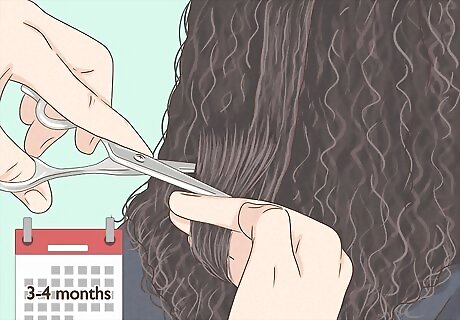
Trim your permed hair every 3-4 months for regular maintenance. New growth weighs down your hair and makes your curls look a bit limper than they did initially. Maintaining your perm is the best way to keep your hair looking healthy and beautiful! Use your best judgment when deciding if you need a haircut or not. If you notice dry ends, excessive tangles, split ends, or frequent knots, you might want to trim your hair even if it hasn’t been 3-4 months yet. If you want to change your hair's length or look, you don’t have to wait any specific amount of time.

















Comments
0 comment